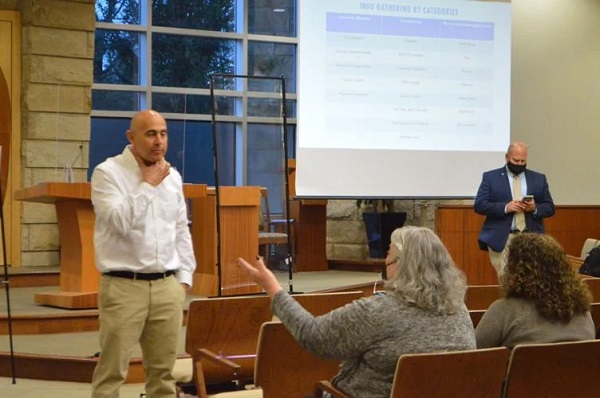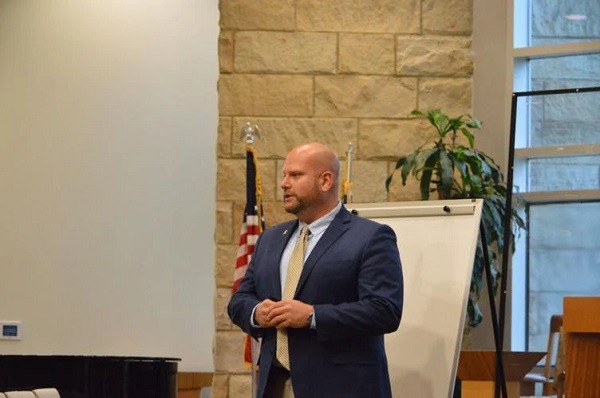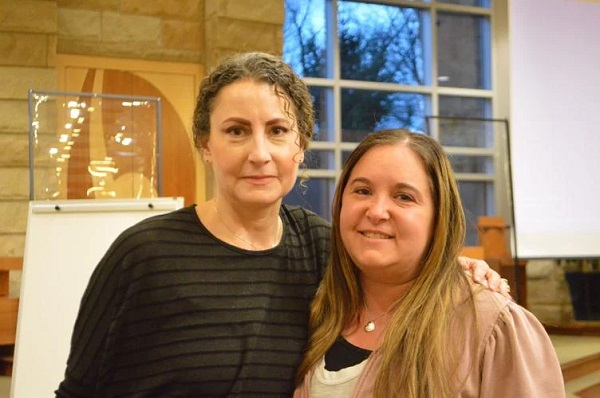03/11/2022
Cleveland on Ground Floor of Advanced Security Training
- Share This Story
COURTNEY BYRNES | STAFF REPORTER
Article reprinted with permission from Cleveland Jewish News

Doron Shalev speaks with participants. CJN Photo / Courtney Byrnes
The Israeli Ministry of Diaspora Affairs offered Community Awareness and Resilience Education security training to the Cleveland Jewish community from March 6 to March 10.
The CARE program has been conducted in Jewish communities in Europe, the United Kingdom, Australia and South America, and this marks the first time the training has taken place in the United States with Cleveland and Detroit as the first two cities.
“It’s a tribute to how far we’ve come as far as building our culture of security here and our measures we’ve put in place that have enhanced security across all of our agencies,” Jim Hartnett, director of community-wide security at the Jewish Federation of Cleveland in Beachwood told the Cleveland Jewish News March 7. “And the participation we get from men, women and children who take this seriously.”
For five days, the training was directed to three different audiences. The first group included security volunteers, ushers, greeters and front office staff at synagogues. The second group was community leaders, synagogue directors, rabbis, day school principals, lay leadership, and board and security committee members. The last groups was off-duty police and security guards that provide security to Jewish facilities.
“Probably the most important audience right now that we are focusing on here is the individuals who volunteer to perform security functions at their synagogues, ushers, greeters, rabbis,” Hartnett said. “That they know how to deal with people that are maybe there for the wrong reasons and question people who don’t look right and then know what to do in the event that they have a threat, how to handle it.”
Over the course of the five days, there were about a dozen training sessions, including seven synagogues, an advance security program on March 9 as a follow-up and a special session on March 10 for JCC directors.
“We’re squeezing as much out of them as we can while they’re here for five days because anything we can learn that helps us stay safe is important that we participate in this type of training,” Hartnett said.
Avidov Bernstein, the executive director of CARE, shared the reason why Cleveland was chosen as one of the first cities in the U.S. to take part in the training.
“We’re here because we know the system here of the security has been a few notches up than other Federations which is something that we acknowledge and we can work and put together a volunteer program to bring up the scale a bit more, bring up a notch or two,” he told the CJN.

Avidov Bernsterin, executive director of CARE. CJN Photo / Courtney Byrnes
Berstein added that across the five days of training and about a dozen of events, “we’re reaching over 300 people.”
“The goal is basically to connect the overall security of the Federation from top to bottom,” Bernstein said, adding that security is about community.
One of the trainings for synagogue ushers and greeters was held March 7 at Temple Emanu El in Orange. The presentation was led by Doron Shalev, CARE’s team security leader with extensive security experience in Israel.
About 25 to 30 people attended the training at Temple Emanu El, which aimed to give them the tools to feel more prepared. The training utilized examples from past attacks against Jews around the world to learn what to look for and what steps to take, like isolating an area and calling the police.
“I think that it’s really important to continually review and keep these things at the top of mind because you’re not going to be able to think straight when something happens,” Michelle Bogomolny, a board member of Temple Emanu El who attended the training, told the CJN.
Bogomolny has attended similar talks with the Federation and Orange police before, but found the training to be a good review, especially to hear it from Israelis who she said are leaders in the security world and have dealt with many threats before.
Shalev showed videos to the participants of past incidents and explained the steps taken and what we can learn from them.

Michelle Bogomolny, left, and Darcy Hershey. CJN Photo / Courtney Byrnes
“I think the videos that he showed, (it’s) very different to see that and him commentating versus seeing things on the news,” Darcy Hershey, an administrative assistant at Temple Emanu El, told the CJN. “It seems much more real, I don’t know why. And maybe it’s because I’m actually sitting in a synagogue to hear it versus sitting in my own living room on the couch.”
Hartnett said he plans to have a discussion after the training as to future opportunities for CARE to return.
“I think if we’re willing to bring them back, they will continue to, through the Ministry of Diaspora, look where they can support us and maybe we can spread this out to nearby federations in Akron, Canton, Toledo, Columbus,” Hartnett said “Because a threat to one of us, is a threat to all of us, and the more training we can get across the region, I think the better prepared we are.”

